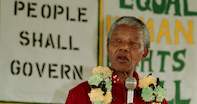
Sharpeville Protests
The anti-pass protests were part of the turmoil of that 1960’s era. Laws to enforce apartheid were pouring out of the all-white parliament and the ANC struggled to resist. It was not successful.
The Pan-Africanist Congress (PAC) emerged as a rival organisation and set the pace for resistance by calling on blacks to leave their passes at home and go to their nearest police station to offer themselves for arrest. The campaign was launched on 21 March 1960 and the results are history: the popular response was patchy but in the township of Sharpeville, near Vereeniging, where a peaceful crowd of thousands gathered, police opened fire and killed 68 people. That galvanised the ANC and it called for protests a week later.
As insurrection flared around the country, the government banned both the ANC and the PAC, declared the State of Emergency and detained thousands without trial.
All-in African National Action Council
The events put new steel into Mandela. With Tambo going into exile abroad, Mandela increasingly became the primary leader. He grew into the role and was the dominant force in driving ahead the next year to express black opposition to the intention of the Afrikaner Nationalists to fulfil their long-cherished dream of declaring a republic, harking back to the Boer republics which had been swept away by the South African War at the turn of the twentieth century. Mandela created the All-in African National Action Council, a thinly disguised version of the banned ANC.
He persuaded a wider section of blacks to take part in it by calling for a general strike on Monday 29 May 1961. It was illegal for black workers to strike so it was called a 'stay-at-home'. The protest's formal launch took place in Pietermaritzburg in March. It was a standard ANC mass gathering: speaker after speaker and with a pre-arranged set of resolutions to be endorsed by popular vote. Excitement swept through the crowded hall when Mandela was suddenly introduced as a speaker.
His name was known, although he had seldom been seen at meetings around the country for much of the previous nine years. He had been under intermittent bannings, which prohibited him from attending meetings or social gatherings, which meant he could not be with more than two people at a time; and he was confined to Johannesburg (except for being allowed to go to Pretoria for the Treason Trial). Despite these restrictions Mandela was highly active inside the ANC.
Banned Leaders Work in Secret
When government bannings had commenced at the start of the 1950s, the ANC had decided on a policy of 'We stand by our leaders', with the result that banned leaders continued to work in secret. The reason for this was laudable but it meant that a leadership developed, which was never subjected to open election and which gradually lost touch with the rank and file because it could not be in easy contact with people.
The best and the worst of this was in evidence in Pietermaritzburg. The Mandela name was known, but the person wasn't. His latest bannings had expired a short while before and he made a surprise appearance on the platform: the announcement of his name as a speaker was greeted with great applause, but he was also a stranger.
In later years, it was claimed that Mandela made a colossal impression at that meeting. But he did not. He delivered a formulaic speech and left quickly out of a side door before the Security Police outside the hall even knew he was there. The meeting went on to endorse the protest call.
Impromptu Speeches
Mandela's charisma seldom reveals itself in set speeches. But his power and ability to reach out to people and enfold them comes when he speaks without notes. The phrases might have been pre-prepared and for someone who went on to make as many speeches as he did, frequent repetition of thoughts and phrases was inevitable.
But the homely, human quality comes through. Anyone who has heard him knows it, such as at an event in Britain in the mid-1990s, when Mandela made an early visit as President of the new South Africa and spoke to a crowd of many hundreds in the garden of the home of the first post-apartheid High Commissioner, Mendi Msimang.
The crowd consisted of expatriates, chiefly whites; they were talented South Africans who had emigrated over the years. Mandela spoke to them of coming home, of how they were needed to build the new South Africa. His words and thoughts were direct and personal, with shafts of the self-deprecating humour which is his style.
I watched the reactions of people around me: he had them in the palm of his hand. He spoke for about 20 minutes and I had no doubt that if, at the end, he had announced that a fleet of aircraft was waiting at Heathrow airport to carry them back, there would have been a mass rush to get on board.
 Among the many, many wonderful stories about Mandela my favourite is the one told to me by Jules Browde, the well-known Johannesburg white l...
Among the many, many wonderful stories about Mandela my favourite is the one told to me by Jules Browde, the well-known Johannesburg white l... She produced and directed a documentary about his visit, 'The Last Mile: Mandela, Africa and Democracy'....
She produced and directed a documentary about his visit, 'The Last Mile: Mandela, Africa and Democracy'....